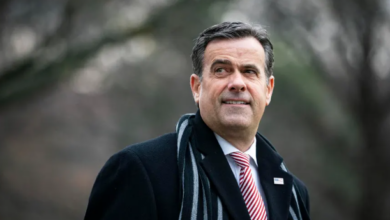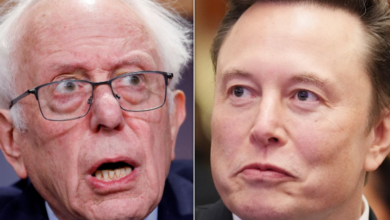Sharice Davids Is In A Fight For Kansas’ Suburban Middle

OVERLAND PARK, Kansas — Near the end of the first televised debate between Rep. Sharice Davids (D-Kan.) and challenger Amanda Adkins, a tiny sliver of bipartisan agreement appeared to emerge: that giving Medicare the ability to negotiate prices for prescription drugs was a good idea.
Adkins, a former executive at health care information company Oracle Cerner, was asked for the Joe Biden idea she supported the most and called drug negotiations “one area where we can come together.” Davids, running for her third term, also cited the idea as her most favored Biden policy.
But a day later, the Republican candidate partially backtracked on her support. And Davids accused her of being deceptive about supporting the idea in the first place.
That kind of back-and-forth over what’s a moderate policy and which candidate is the more moderate one has been central in the race to represent this congressional district on the Kansas side of the Kansas City suburbs. The district’s heart in Johnson County is a seemingly endless maze of four-lane arterial roads, tidy homes in shady, tree-lined cul-de-sacs and strip shopping centers with ample free parking.
It is a district that Davids’ supporters say is growing increasingly purple, reflecting its upper middle-class population and one that wants non-ideological, pragmatic problem-solving. The soft-spoken Davids would appear in some ways a perfect fit, playing up a bipartisan approach to governing.
But maybe not this year. The district was redrawn, with one state lawmaker saying outright that the goal was to ensure there would be no Democratic House members from the state. Republicans seem to have regained some of their pre-Dobbs decision political momentum. And Davids is facing a rematch with her 2020 opponent. If Democrats can hold Kansas’ Third District, it may mean they can hold other, similar districts across the nation. If they lose it, though, it may mean a long night for them.

Molly Ramsay, a 64-year-old retired printing worker who attended Davids’ early voting kickoff rally Saturday, told HuffPost Davids has done well for Johnson County.
“We had a Republican candidate for years and she beat him and it’s just been a breath of fresh air. Because I do believe Johnson County is becoming much more of a purple county,” she said.
“They talked about Kansas being so red? Johnson County is pretty darn purple.”
Backing up that message was a victory in the August statewide referendum on whether to restrict abortion rights, where the almost 60% vote for the “no” position surprised pundits with both the result and the margin.
It was a lesson not lost on Davids’ campaign, which hopes to replicate its success in November. And it will need to, given her district’s new contours. Redistricting saw her lose a Democrat-heavy portion of Wyandotte County and gain two more rural counties well south of Kansas City. It went from a district where Biden won by almost 11 points in 2020 to one where he would have won by only 4.5 points, according to Daily Kos data.
And that was by design. While the redistricting process went through a number of steps before being settled by the state Supreme Court, it started with then-Kansas Senate President Susan Wagle saying lawmakers could draw a map that would ensure an all-Republican House delegation.
“I guarantee you, we can draw four Republican district maps,” she said.
Despite that, the race has been categorized as a toss-up or lean Democratic one for some time. The Cook Political Report moved it from the “toss-up” category to “lean Democratic” on Tuesday. And The New York Times on Thursday said a recent poll showed Davids with a 14-point lead.
“I guarantee you, we can draw four Republican district maps.”
– Former Kansas Senate President Susan Wagle
In some ways, though, Davids would seem to be an unlikely match for the district, even before redistricting brought two rural counties into the mix. She’s one of first two Native American women to be elected to the House, a former MMA fighter, and gay.
“I think people here are glad when folks get to see that Kansas might not be the place that you assume that it is,” she told HuffPost in an interview.
“We have a lot more diversity here than people think. We have a lot more open-minded people here than people assume,” Davids said.
Adkins said she was running again not because of the redistricting, which was only finalized in the spring, but because of how Biden’s term has gone so far.
“I knew that there would be things that occurred that I didn’t agree with, but I could never have imagined that we would be where we are today,” she told HuffPost, citing inflation and the likelihood of a recession.
Adkins, too, describes herself as “solution-focused and a business leader” reflecting the pragmatic and common sense leanings of the district.
Both candidates are seeking to tie the other to unpopular figures to convince voters they are not the right fit. For Adkins, she brings up Biden and Davids’ willingness to vote with him 100%, a figure Davids says is based off of a small sample of recorded votes.

Wichita Eagle via Getty Images
For Davids, the political albatross she’s trying to hang on Adkins’ neck is former Kansas governor and U.S. senator Sam Brownback, who was elected governor while Adkins headed the state GOP and later appointed Adkins to head a state board that reviews children’s programs and funding. Adkins notes she was not paid by the state of Kansas and was not part of Brownback’s administration.
“Sam Brownback did so much damage to this state, in terms of decimating our public education funding. There were times when some of our public school systems had to go down to four days a week and our credit rating was downgraded,” Davids said.
“Her attempt to kind of distance herself from some of those things, it’s just very clear,” she said.
The Davids campaign was quick to jump on Adkins’ comments about Medicare drug negotiations the night of the debate, issuing a “fact check” pointing out Adkins supports the fiscal 2022 budget proposed by the Republican Study Committee, the House GOP’s biggest intraparty group.
The RSC budget opposed “efforts to index drug prices or to impose any price controls on pharmaceuticals.”
But Adkins herself was quick to say the day after the debate she did not mean to sound complimentary toward the idea.
“The federal government, as a payer when it comes to Medicare, can and should negotiate on drug prices to get the best possible drug price,” she said. But Adkins said she worried it would mean less research, a line the drug industry took in opposing the idea.
“In this country, we are capitalists and we have in health care a free market system and what we don’t want to do is discourage innovation when it comes to the future of life-saving drugs,” she said.

Kyle Rivas via Getty Images
While the rural counties will likely help Adkins, both candidates held events on the first day of early voting within a mile and half of each other in Johnson County, underscoring its importance. Whose voters show up will go a long way toward determining who will win.
Jim Hissong, a 75-year-old semi-retired insurance salesman, held a closed-press “Ask Amanda” event for supporters at his house. Afterwards, he said his big issues are immigration and the economy.
“I have 16 grandkids and I’m getting really concerned about their future with what’s happening, I don’t know how else to say it,” he said.
Stephen Nachtsheim, a 24-year-old college graduate student studying biomedical communications, said he was not really “super invested” in either party but cast his early votes for Davids and other Democrats.
“I know that socially I’ve had friends who have had abortions and that are gay or trans and I think that, while I don’t believe that either side is kind of doing everything that I think should be done, I think that the Democrats are more in line with what I want to do in regards to personal freedom and liberty,” he said.
[ad_2]
Source link





